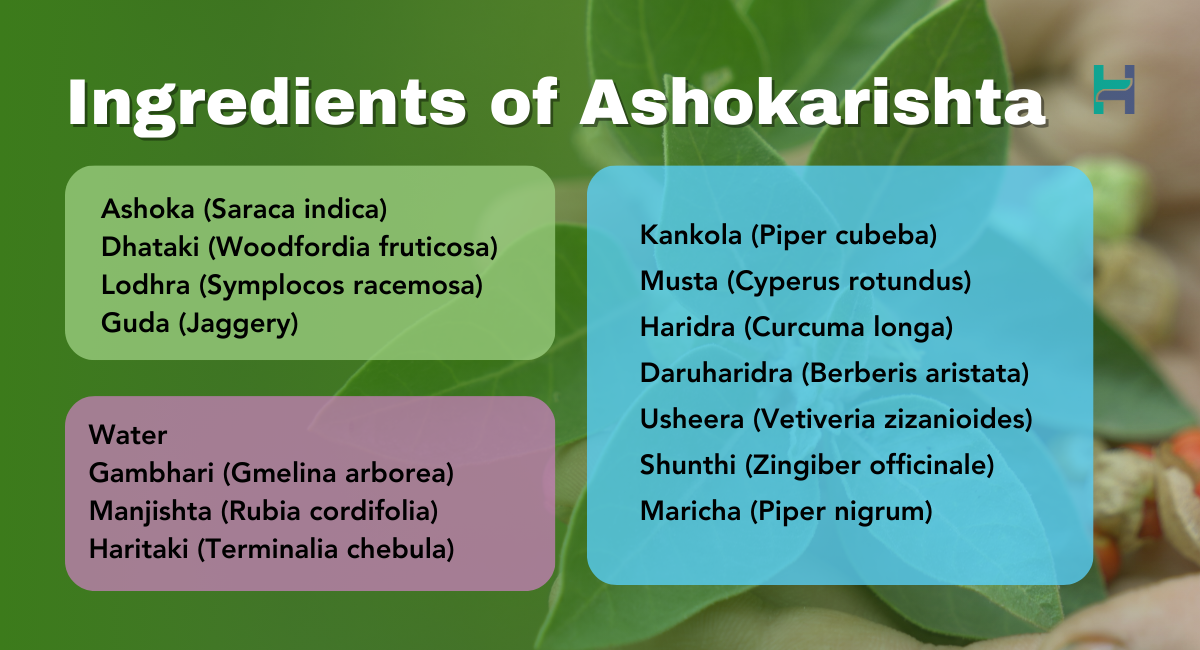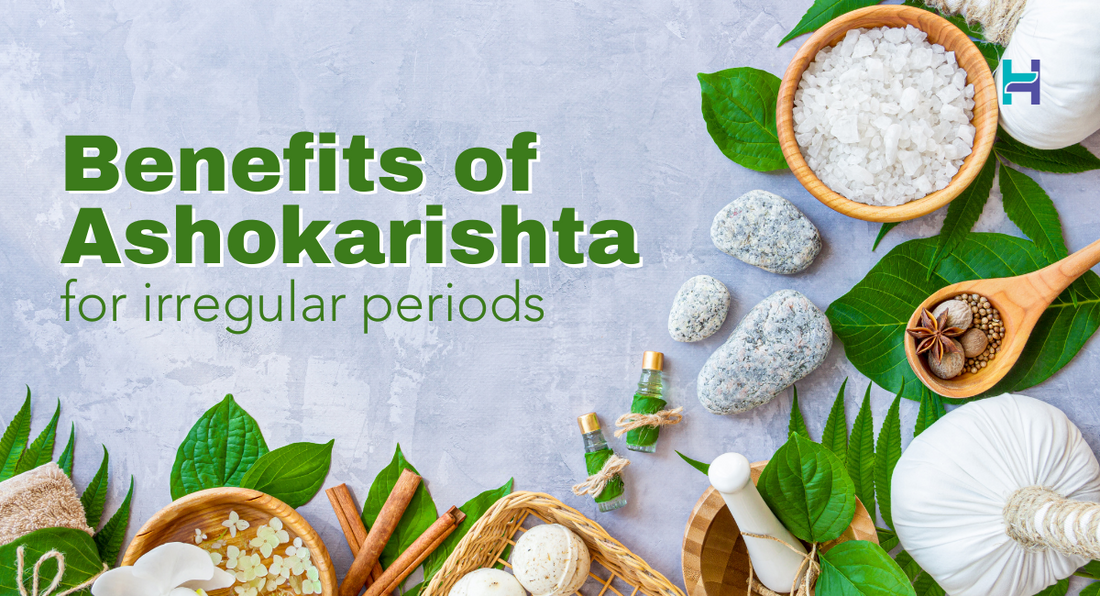Experiencing heavy menstrual bleeding? Try Ashokarishta Syrup.
Ashokarishta (AKA Asokarstam) is a well-known Ayurvedic syrup prepared from the bark of the Ashoka tree. It is commonly called the ‘natural friend’ of women and is used to address a variety of women's health concerns. It’s especially useful in the treatment of severe menstrual bleeding known as menorrhagia. It is also effective in treating irregular, delayed, or painful menstruation.
In this blog post, we’ll go through all the important points you should know about Ashokarishta syrup and how it’s beneficial for irregular periods.
Keep reading till the end.
What is Ashokarishta?
Ashokarishta is a liquid tonic derived from the Ashoka tree bark and various natural herbs and spices. The Ashoka tree is indigenous to India and has been utilized in Ayurvedic medicine for millennia owing to its therapeutic qualities. The tonic is created by fermenting Ashoka tree bark in water and adding additional natural components like ginger, cardamom, and cinnamon.
The tonic has a high concentration of antioxidants, phytoestrogens, and other natural components that control hormone levels and promote reproductive health. It is also a natural diuretic, which helps the body eliminate impurities and improves healthy blood flow.
Composition of Ashokarishta
The main composition of Ashokarishta is water of decoction, jaggery, and Ashoka tree (Saraca asoca).
- Ashoka tree - it has anticarcinogenic and anticancer properties.
- Bibhitaki – it has anti-inflammatory qualities.
- Vasa - It has muscular relieving qualities.
- Mustaka- It may have anti-inflammatory action.
- Amrasthi – it has potential anti-tumor effects.
- Amalaki – it has antioxidant, anti-inflammatory, and immunomodulatory effects.
- Nilotpala – it has pain-relieving and anti-inflammatory effects.
- Krishna Jeeraka – It has anti-spasmodic qualities.
- Haritaki - Antioxidant, anti-carcinogenic.
- Mustaka- It has anti-inflammatory action.
- Shweta Jeeraka - It has antispasmodic and anticarcinogenic qualities.
- Daruharidra – it has anticancer and anti-inflammatory effects.
- Dhataki- It has potential anti-tumor effects.

Preparation method of Ashokarishta
Ashoka tree bark may be removed and prepared into a decoction. Other therapeutic plants are then combined with this decoction and allowed to organically ferment to create Ashokarishta.
Here are 7 steps to prepare Ashokarishta
- Wash and dry the Ashoka plant to produce powdered bark.
- To produce the decoction, boil the powdered Ashoka bark in a considerable amount of water.
- Transfer the decoction to a glass container and stir in the jaggery.
- Boil and filter the mixture.
- Then, turn the other materials stated above into a powder. Add the powder to the decoction.
- Close the jar with a lid and set a temperature for the fermentation process to begin.
- Fermentation takes a few days, and Ashokarishta is created.
How Ashokarishta Works for Irregular Periods?
1. It stops excessive menstrual bleeding
Menstrual bleeding usually lasts 3-5 days, but if it lasts longer than that, the disorder is known as menorrhagia. The principal element of Ashokarishta, Ashok (Saraca asoca) bark, is said to have astringent properties that stop excessive menstrual bleeding. Astringents function as a uterine tonic, regulating the menstrual cycle and flow rate.
2. It helps relieve menstrual pain and cramps
Pain during menstruation, also known as dysmenorrhea, is a disorder characterized by pain or discomfort (cramps) during or immediately preceding a period. The discomfort commonly originates in the pelvic or lower abdomen.
Ashokarishta is made up of a variety of chemicals with varying therapeutic effects. It is believed beneficial in lessening the spasms and discomfort associated with unpleasant periods.
3. It provides relief from Menopausal Syndrome
Menopausal Syndrome is a set of symptoms related to physiological changes that occur in a woman's body once her fertile cycle stops. Hot flushes, nocturnal sweats, mood changes, and weakness are among the possible symptoms. Ashokarista is a useful Ayurvedic ancient medication that can assist in managing menopausal symptoms.
According to the Ayurvedic literature, the menopausal syndrome is linked to Rajonivritti, which is produced by the aggregation of Vata doshas. Ashokarishta aids in the regulation of Vata dosha due to its Snigdha and Vata balancing properties. These characteristics operate against Vata's Ruksha (dry) nature, relieving menopausal symptoms.
4. It helps with female infertility
One of the leading reasons for female infertility is hormonal imbalance, which can result from Polycystic Ovarian Disease (PCOD). There are several more causes of infertility, including worry, sadness, and sleeplessness. According to Ayurveda, all three doshas have a role in female infertility, which can lead to the buildup of toxins inside the body.
Ashokarishta is typically administered in cases of female infertility to assist internally and cleanse toxins out of the body through a process called Shodhana (body detoxification).
5. It helps with indigestion in women
Indigestion refers to pain in the upper belly. It is defined as the state of inadequate digestion of ingested material. Ayurveda refers to dyspepsia as Agnimandya. This is caused by an imbalance of the Pitta dosha.
Indigestion occurs when food is left undigested owing to Mand agni (poor digestive fire), resulting in the production of Ama (toxic residues in the body caused by faulty digestion). Ashokarishta aids in the digestion of Ama due to its Pachak (digestive) properties. It boosts the digestive fire by balancing the Pitta dosha.
Scientific research on the treatment of Ashokarishta
- A clinical investigation discovered that the combination of Ashokarishta, Ashwagandha Churna, and Praval Pishti significantly reduced menopausal symptoms.
- Ashokarishta relieves vaginal dryness, joint and muscle pain, and gastrointestinal issues.
- The Ashoka tree is also used to cure diarrhea, dysentery, and skin conditions.
- Ashoka tree bark extract has been shown to have anti-diabetic effects, which assist in managing blood sugar levels.
Usage of Ashokarishta
Ashokarishta should be consumed twice per day after meals (5-10 ml), along with an equal amount of water. Your Ayurvedic physician will recommend a dose based on your age and condition. Before beginning therapy, you must first have a thorough evaluation and diagnosis of your ailment.1
For information on the form and dose, visit your Ayurvedic physician. Furthermore, we recommend that you should not substitute or discontinue your present drugs with any herbal products derived from ashokarishta without first consulting a physician or an Ayurvedic doctor.
Precautions
- There is insufficient evidence to support the usage of Ashokarishta in lactating women. Consumption of herbal drugs during breastfeeding is typically not recommended.
- There is not enough data to support the usage of Ashokarishta in pregnant women. It is best to avoid using any herbal supplements without first seeing your doctor.
Side effects of Ashokarishta
Although most individuals find that Ashokarishta is safe when taken as prescribed, it's necessary to be aware of any possible adverse effects, particularly if taking significant dosages or using it for a longer period of time. The following are a few possible Ashokarishta adverse effects:
- Gastric discomfort: Some people may have digestive problems, such as diarrhea, nausea, or upset stomachs.
- Allergic Reaction: Rarely, allergic reactions to the herbs or chemicals in Ashokarishta may transpire, resulting in symptoms including skin rashes, itching, or breathing difficulties.
- Medication interaction: Blood thinners and diabetes drugs, in particular, may interact with ashokarishta. Before taking Ashokarishta, it's important to speak with a healthcare provider, particularly if you're on other medications.
- Hypoglycemia: People with diabetes should regularly check their blood sugar levels while using Ashokarishta, as some of the herbs may drop blood sugar levels.
Bottom line
Ashokarishta is a strong Ayurvedic medicine that offers several advantages to persons who have irregular periods. Its natural components work together to balance doshas, regulate hormone levels, and relax the uterus, resulting in regular menstrual cycles.
Individual outcomes may vary but Ashokarishta's centuries-old reputation in Ayurveda, as well as good customer testimonies, testifies to its effectiveness.
However, it is critical to utilize Ashokarishta under the supervision of a skilled Ayurvedic practitioner, as the dose and duration might vary depending on individual requirements. Before beginning any new natural treatment program, it is best to get expert counsel.
Frequently Asked Questions
Q1: Can I take Ashokarishta during periods?
Yes, Ashokarishta may be taken during periods. It is considered one of the best for managing menstrual discomfort and irregularities.
Q2: How long does it take to see results with Ashokarishta?
It claimed to see results after 2 months of consumption. However, Some people may notice improvements within a few weeks of regular use.
Q3: Is it safe to use Ashokarishta long-term?
If any unpleasant responses persist over an extended length of time, it is best to visit a healthcare expert.
Q4: Does Ashokarishta help in hormone balance?
Yes, Ashokarishta is traditionally believed to help in hormone balance, particularly in women. It contains a variety of herbs and ingredients that are known for their hormone-regulating properties.



